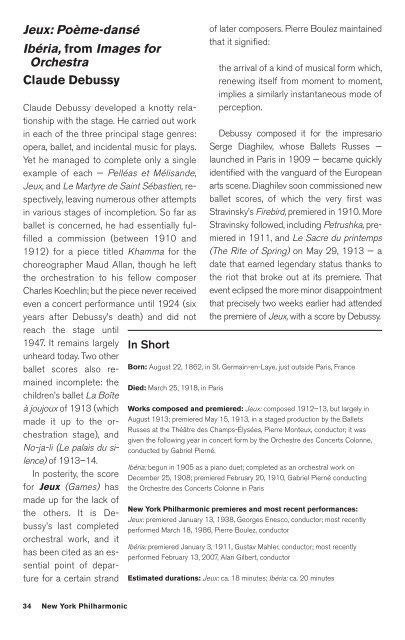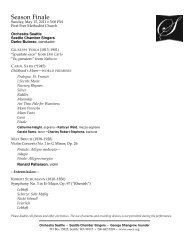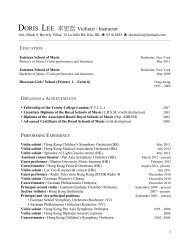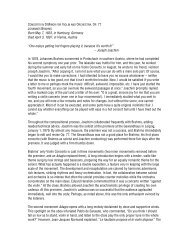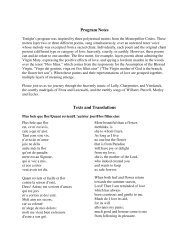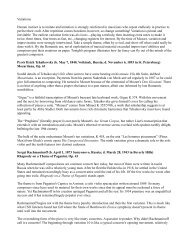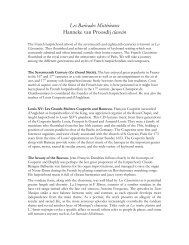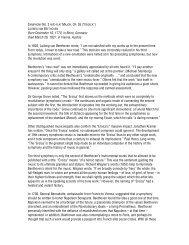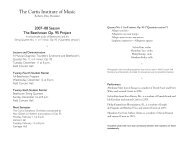download - InstantEncore
download - InstantEncore
download - InstantEncore
You also want an ePaper? Increase the reach of your titles
YUMPU automatically turns print PDFs into web optimized ePapers that Google loves.
10-13 Mahler:Layout 1 10/3/11 11:38 AM Page 34<br />
Jeux: Poème-dansé<br />
Ibéria, from Images for<br />
Orchestra<br />
Claude Debussy<br />
Claude Debussy developed a knotty relationship<br />
with the stage. He carried out work<br />
in each of the three principal stage genres:<br />
opera, ballet, and incidental music for plays.<br />
Yet he managed to complete only a single<br />
example of each — Pelléas et Mélisande,<br />
Jeux, and Le Martyre de Saint Sébastien, respectively,<br />
leaving numerous other attempts<br />
in various stages of incompletion. So far as<br />
ballet is concerned, he had essentially fulfilled<br />
a commission (between 1910 and<br />
1912) for a piece titled Khamma for the<br />
choreographer Maud Allan, though he left<br />
the orchestration to his fellow composer<br />
Charles Koechlin; but the piece never received<br />
even a concert performance until 1924 (six<br />
years after Debussy’s death) and did not<br />
reach the stage until<br />
1947. It remains largely<br />
unheard today. Two other<br />
ballet scores also remained<br />
incomplete: the<br />
children’s ballet La Boîte<br />
à joujoux of 1913 (which<br />
made it up to the orchestration<br />
stage), and<br />
No-ja-li (Le palais du silence)<br />
of 1913–14.<br />
In posterity, the score<br />
for Jeux (Games) has<br />
made up for the lack of<br />
the others. It is Debussy’s<br />
last completed<br />
orchestral work, and it<br />
has been cited as an essential<br />
point of departure<br />
for a certain strand<br />
34 New York Philharmonic<br />
In Short<br />
of later composers. Pierre Boulez maintained<br />
that it signified:<br />
the arrival of a kind of musical form which,<br />
renewing itself from moment to moment,<br />
implies a similarly instantaneous mode of<br />
perception.<br />
Debussy composed it for the impresario<br />
Serge Diaghilev, whose Ballets Russes —<br />
launched in Paris in 1909 — became quickly<br />
identified with the vanguard of the European<br />
arts scene. Diaghilev soon commissioned new<br />
ballet scores, of which the very first was<br />
Stravinsky’s Firebird, premiered in 1910. More<br />
Stravinsky followed, including Petrushka, premiered<br />
in 1911, and Le Sacre du printemps<br />
(The Rite of Spring) on May 29, 1913 — a<br />
date that earned legendary status thanks to<br />
the riot that broke out at its premiere. That<br />
event eclipsed the more minor disappointment<br />
that precisely two weeks earlier had attended<br />
the premiere of Jeux, with a score by Debussy.<br />
Born: August 22, 1862, in St. Germain-en-Laye, just outside Paris, France<br />
Died: March 25, 1918, in Paris<br />
Works composed and premiered: Jeux: composed 1912–13, but largely in<br />
August 1913; premiered May 15, 1913, in a staged production by the Ballets<br />
Russes at the Théâtre des Champs-Élysées, Pierre Monteux, conductor; it was<br />
given the following year in concert form by the Orchestre des Concerts Colonne,<br />
conducted by Gabriel Pierné.<br />
Ibéria: begun in 1905 as a piano duet; completed as an orchestral work on<br />
December 25, 1908; premiered February 20, 1910, Gabriel Pierné conducting<br />
the Orchestre des Concerts Colonne in Paris<br />
New York Philharmonic premieres and most recent performances:<br />
Jeux: premiered January 13, 1938, Georges Enesco, conductor; most recently<br />
performed March 18, 1986, Pierre Boulez, conductor<br />
Ibéria: premiered January 3, 1911, Gustav Mahler, conductor; most recently<br />
performed February 13, 2007, Alan Gilbert, conductor<br />
Estimated durations: Jeux: ca. 18 minutes; Ibéria: ca. 20 minutes


